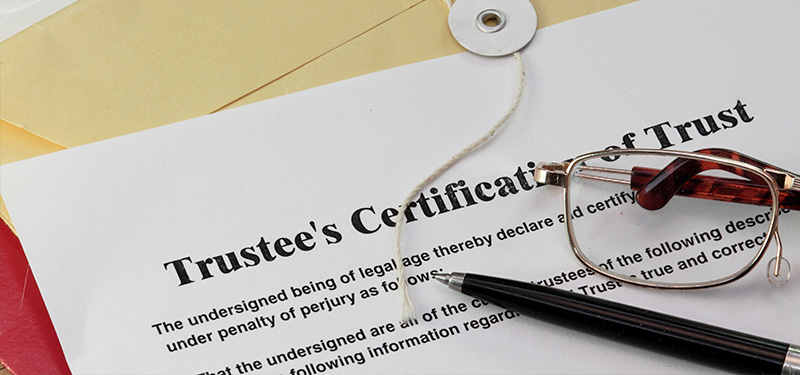Trustee certificates are an important and necessary part of board governance, but they are an often-neglected component. Trustee certificates are recorded with the county registry of deeds in which the condominium is located and evidence for the world the identity and authority of members of the condominium association’s governing board. Most condominiums require a certificate to be recorded each year, or upon the filling of any board vacancy. The lack of a valid and recently recorded trustee certificate is a serious concern for condominium boards and property managers, as the inability to prove the authority of the existing board members can prevent the board from carrying out its required powers and duties granted by the Massachusetts Condominium Statute, G.L. c. 183A, and in the condominium’s governing documents.
By failing to record a valid trustee certificate pursuant to the requirements of the governing documents or upon the creation of a vacancy in an office of trustee, many boards are subjecting themselves to unnecessary delay, disputes, or administrative processes upon attempting to take action.
Trustee certificates have various requirements depending on the governing documents of the condominium, but most trustee certificates should, at a minimum, contain the following information: (1) a reference to the date and the book and page of the condominium’s by-laws or declaration of trust as it is recorded with the county registry of deeds; (2) the date of the election or appointment and the process employed pursuant to the appropriate section of the governing documents; (3) the printed and legible identity of each board member being elected, re-elected, appointed, or re-appointed; (4) the identity of each additional board member; (5) the term of each board member, if any; (6) the acceptance of appointment or election by any elected, re-elected, appointed, or re-appointed board member; (7) the mailing address of the condominium; and (8) dated, ink-signed and notarized signatures of necessary parties as identified in the condominium’s governing documents. This information helps to ensure that unit owners and interested third parties can easily understand the identity and authority of the members of the board. The board members and/or property manager should review the requirements of the subject condominium’s governing documents to confirm that their documents do not require the inclusion of additional or other information and, if necessary, should consult association counsel for clarification.
While the above-identified information is the gold standard for reference and recording purposes, it is important for every board and property manager to ensure that the election or appointment process detailed in a trustee certificate, and the signatures thereon, comply with the governing documents of the condominium to ensure the certificate’s validity prior to its recording.
Ensuring compliance with condominium election and/or appointment requirements may require specific unit owners or groups to hold an election/vote or to make an appointment, and these requirements often vary depending on the size and use of the condominium. In some mixed-use condominiums, one or more trustees may need to be appointed or elected to represent commercial or residential interests. In most residential condominiums, an election or appointment must occur at an annual or special meeting of the unit owners, or may be completed by remaining board members in certain circumstances. The governing documents of smaller condominiums often require trustees to be appointed by individual unit owners. Trustee vacancies and the required election or appointment process for new or returning board members should be discussed with association counsel to ensure the validity of the process.
Once the election process has occurred, a trustee certificate must be signed by the appropriate parties, with those signatures notarized as required. The governing documents may require specific unit owners, a percentage of unit owners, existing members of the board of trustees, or even a particular officer of the board to sign the trustee certificate. Most governing documents will also require the new or returning trustee to sign accepting their appointment. At least one, and in some cases all, of the signing parties will require their signatures to be notarized. Failure to comply with these requirements can result in questions as to whether trustees have been validly elected or appointed and whether they are validly serving as trustees, so association counsel should be consulted as to any procedural questions.
Upon the appropriate and valid execution of a trustee certificate, it should then be recorded with the county registry of deeds as soon as is reasonably practicable. Most governing documents require the recording of trustee certificates, which recording provides proof to all third parties of the identity and authority of the members of the board, and unit owners are charged with at least constructive knowledge of those recorded documents. Recording is a relatively simple and inexpensive process and can be accomplished by a board with the assistance of their property manager or association counsel.
Proving the identity and authority of board members on a recorded trustee certificate is very important, as it assists board members to fulfill their fiduciary duties and to properly act pursuant to their powers and duties granted in the governing documents and Chapter 183A. Boards have myriad powers and duties that could be complicated by being without the recorded document that proves their authority to act on behalf of the condominium association.
By failing to record a valid trustee certificate pursuant to the requirements of the governing documents or upon the creation of a vacancy in an office of trustee, many boards are subjecting themselves to unnecessary delay, disputes, or administrative processes upon attempting to take action. In addition, in the absence of a newly recorded trustee certificate upon the resignation or removal of a trustee, that individual may continue to attempt to act as a trustee, with no third party having any notice that the former trustee no longer has the authority to do so. The valid recording of a trustee certificate solves each of these issues.
Trustee certificates may be considered a relatively straightforward, mundane component of board governance, but they serve a very important role, and trustees and property managers should pay close attention to confirm they are properly recording these instruments as required.


